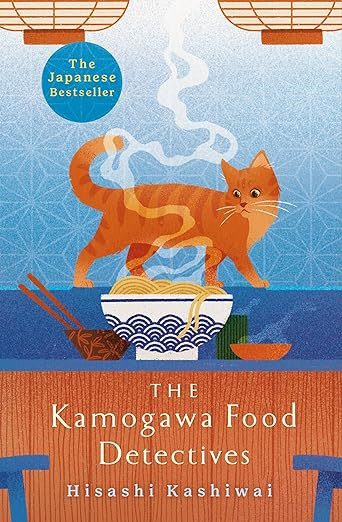
Title. The Kamogawa Food Detectives
Author: Hisashi Kashiwai
Genre: Fiction/Novel
Language: English (Translated from Japanese by Jesse Kirkwood)
Year: 2023 (English publication; originally published in Japanese in 2013)
Publisher: Pan Macmillan
Pages: 208
Price: INR 322.00
ISBN: 978-1035009589
In his magnum opus, The Physiology of Taste, published in December 1825, just two months before his death, the French lawyer, politician and gastronome Jean Anthelme Brillat-Savarin, wrote, “the Creator, when he obliges man to eat, invites him to do so by appetite, and rewards him by pleasure…. the pleasure of the table belongs to all ages, to all conditions, to all countries, and to all areas; it mingles with all other pleasures, and remains at last to console us for their departure.” The bon vivant sleuth in him even famously claimed, “tell me what kind of food you eat, and I will tell you what kind of man you are.”
Along an interesting tangent evocative of these Savarinian aphorisms, Hisashi Kashiwai dishes out a gastronomic delight in his bestseller, The Kamogawa Food Detectives. The book was originally published in Japanese by Shogakukan in 2013 under the title of Kamogawashokudo. Its English translation deftly rendered by Jesse Kirkwood, was published in 2023.
The story begins in the neighborhood of the obscure lane of Shomen-dori, which stands in stark contrast to the bustling touristy image of Kyoto. The ‘Kamogawa Diner’ runs on the second floor of an unassuming run-down building. Nagare Kamogawa, a former police officer and widower, runs this restaurant along with his daughter Koishi. But, there’s more to what meets the eyes. The diner has a secret back-office, where the father and daughter run their detective agency. Their sole strategy to reach the public is through a single line advertisement in the ‘Gourmet Monthly’ magazine, which states “Kamogawa Diner – Kamogawa Detective Agency – We Find Your Food”. Its obscurity often confuses people and they run up and down the Kamogawa river in Kyoto looking for it. Despite the hassles and complaints, Nagare stays stubborn against changing this advertisement strategy because he believes, “if someone’s really destined to walk into this place, that one line will be all they need.” And indeed, we see the destined ones discovering the Kamogawa diner to avail the detective agency’s services.
The book is structured in six episode-like stories. Making their way around Higashi Honganji, the customers trace a shabby building where the fragrance of delicious meals billowing out along with chirpy banter is ample indication that they have arrived at the restaurant-cum-detective agency. As they enter the premises, they are served a set meal for 500 yen by the Kamogawas. They are then escorted to the back office, where Koishi, the daughter, requests them for some paper work and gets straight to business. Each time, the customer asks them to cook a specific cuisine recalled from memory, only giving her patchy, nostalgic details – visual, auditory and olfactory ones. The father, Nagare, carries out all the detective work after careful ‘deduction’ from the hints captured by Koishi; having figured out the ingredients and recipe, he serves the desired dish to the respective customer after two weeks. The payment for the services is left to the customer’s discretion depending on his or her satisfaction with the food served. After solving each case successfully, Nagare and his daughter find a way to remember his late wife; and thus, each episode concludes in memoriam – the father and daughter, paying respect to the departed soul.
In the course of six tender stories, the reader riding on waves of curiosity, also gets insight into how just a simple meal can bring comfort, dispel prejudices or misunderstandings, heal trauma, and help the living relive their memories with the departed ones. Every customer has a unique reason as to why they want that specific food to be served. All reasons brim with fragility of being human, and all stories find their mortal characters trying their best to come to terms with it. The reader is not only lost in the taste of savory Japanese cuisines but also finds timely reminders to some valuable lessons of life – “we get used to things too easily. You think something’s tasty the first time you eat it, but then you start taking it for granted. Never forget your first impressions.”
Kashiwai’s book is an ode to Japanese culinary customs and variety. Nagare traverses the length and breadth of Japan in search of ingredients and techniques to get every customized dish perfect to the last taste. We discover different geographic regions with peculiar ways of cooking respective dishes, and finer nuances of Japanese culture – “there’s no such thing as ‘dessert’ in Japanese cuisine. The fruit served at the end of the meal is called mizugashi.”
As you flip through the pages, the crockery clatters and the chopsticks dance; and in the background of heart touching stories, you suddenly find your mouth watering for all delicacies served on the table – sushi, udon, miso shiro, Sakura mochi, tonkatsu, sashimi, nikujaga, sake and what not! The book is evocative of another Japanese work, a Netflix series titled ‘Midnight Diner: Tokyo Stories’ which is set in a restaurant in Tokyo. But the author, Kashiwai is after all a Kyoto-ite through and through. The readers will find themselves meandering along Kamogawa river to Demachiyanagi, strolling through the Tadasu forest, visiting Shimogama jinja, or reaching the Sanjo station and taking the Keihan line.
The Kamogawa Food Detectives offers a culinary and cultural journey into the far-east through the eyes and hearts of its characters. Through their immensely relatable human stories, it also engages the inner eye of the reader towards a personal contemplation. Food is the fuel on which all bio-machines function; and it takes something just as basic and simple as a regular meal to earn the most valuable things in life – love, company, acknowledgement and an appreciation of human experiences.
A delectable read with mystery ridden tender tales and appetizing aromas wafting out of its pages, this book triggers your personal gastronomical nostalgia to profoundly remind you that eating good food, like every good thing in life, isn’t just about “enjoying it, but also being grateful for it.”
Happy reading and bon appétit!
■■
Aditi Yadav is a public servant from India. She is also a South Asia Speaks fellow (2023). Her works appear in Rain Taxi Review , EKL Review, Usawa Literary Review, Gulmohur Quarterly, Narrow Road Journal, Borderless Journal and the Remnant Archive.

Subscribe to our newsletter To Recieve Updates
Join our newsletter to receive updates